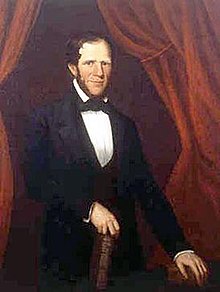Thomas Roderick Dew
| Thomas Roderick Dew | |
|---|---|
 |
|
| 13th President of the College of William & Mary |
|
|
In office 1836–1846 |
|
| Preceded by | Adam Empie |
| Succeeded by | Robert Saunders, Jr. |
| Personal details | |
| Born | 1802 King and Queen County, Virginia |
| Died | 1846 |
| Education | The College of William & Mary |
| Occupation | Professor of History, Metaphysics, and Political Economy University |
Thomas Roderick Dew (1802–1846) was an American educator and writer. He was the thirteenth president of The College of William & Mary from 1836 until his death in 1846.
Thomas Dew was born in King and Queen County, Virginia in 1802, son of Captain Thomas Dew and Lucy Gatewood Dew. His father was a Revolutionary War soldier and founder of Dewsville, a prosperous plantation near Newtown, King and Queen County. He attended The College of William & Mary, graduating in 1820.
He was a professor of history, metaphysics, and political economy at William & Mary from 1827 to 1836.
In 1832, he published a review of the celebrated slavery debate of 1831–32 in the Virginia General Assembly, A Review of the Debates in the Legislature of 1831 and 1832, which went far towards putting a stop to a movement, then assuming considerable proportions, to proclaim the end of slavery in Virginia. The Virginia legislature's debate was a response to Nat Turner's slave rebellion of August 1831. While his position was convincing to many southern readers, Jesse Burton Harrison of Lynchburg, Virginia, wrote a robust response that argued that colonization was possible and that slavery was economically inefficient. Dew's largest work was Digest of the Laws, Customs, Manners, and Institutions of Ancient and Modern Nations (1853). It drew in some ways on works like P. Austin Nuttall's A classical and archaeological dictionary of the manners, customs, laws, institutions, arts, etc. of the celebrated nations of antiquity, and of the middle ages
Dew was well respected in the South; his widely distributed writings helped to confirm pro-slavery public opinion. His work has been compared to that of the southern surgeon and medical authority Samuel A. Cartwright, who defended slavery and advocated the beating of slaves who absconded from their duties or became idle. He co-authored The Pro-Slavery Argument with Harper, Hammond and Simms.
...
Wikipedia
